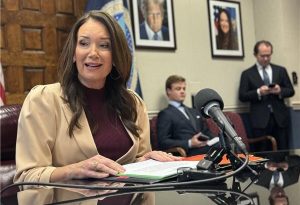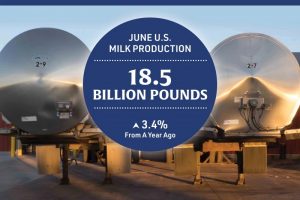
Well, in defined places on the farm, that is, and as a way of keeping dairy farming environmentally friendly and sustainable.
Technology around toilet training is one of the “threads” exercising the minds of Piggott’s team at Halter after the start-up’s phenomenal success using “cowgorithms” to farm dairy cows.
“If you can train a cow to move left and right … move them around a farm, then why can’t you train them to urinate in a shed?” he asks.
Pokuru dairy farmer Pete Morgan is among farmers who’ve hitched Piggott’s collars to the herd and he’s now enjoying the benefits of the fence-free technology.
The electronic devices which the cows wear around their neck pick up every move and use sound and vibration to guide and contain them.
His four staff have a more strategic role now, working to maximise pasture and minimise inputs rather than spending time herding the animals to the dairy shed and shifting breaks in the rain and mud.
Piggott and Morgan were among panellists at the dairy industry’s Dairy 2032 event in Canterbury, looking forward to dairying a decade from now.
Morgan was in no doubt the dairy industry would be going strong in a decade’s time despite the world’s focus on alternative proteins and plant-based diets.
“As long as people are still eating food there will be a dairy industry without a doubt.
“It will be different but it will be there absolutely.”
“The consumers … will be closer to us – their understanding of what we do, our footprints in terms of animals and animal welfare, our staff and our environment and our emissions, hopefully we will be so solidly on track to slamming our methane emissions.
“We have the opportunity to be a real rock star … and we certainly expect to be.”
It is something farmers need to get on top of despite having few tools at present to help them reach emission reduction goals, he said.
“Not because of the regulatory environment. It is because we need to do it for us and our planet.”
He said farmers were feeling first-hand the effects of climate change and could not afford not to.
The intensive nature of dairying and its effect on nitrate levels is something he’s all too aware of when considering dairying for the future.
Advancements in genetics meant cows were becoming more efficient and stocking rates overall were reducing by one cow per 150 every year.
Morgan aims to have all feed produced on-farm instead of importing the stuff and is growing lucerne this year for the first time, minimising tillage which releases carbon sequestered in soil into the atmosphere.
Being set up to take advantage of every new tool out there was also key, he said.
Halter had already reduced his staff’s hours from 55 to 60 hours a week to less than 45 hours.
No one gets to the cowshed before 6am all season when previously they had to be there at 5.30am ready to put cups on and his staff find they have less of a manual job nowadays.
“They are designing breaks with different shapes that will optimise exactly the accurate allocation of feed.”
Cows move at their own pace in their pecking order and the farm has had a huge lift in productivity, Morgan said.
Piggott expected dairy farmers would need a system like his within five years to keep up with expectations around the industry.
“We have to be better, right? I find that quite exciting.”
He said demand was high for the product.
“We’re spending more of our time finding out how we can build more collars in China.”
“A lot of farmers are looking at the headwinds or challenges on the horizon and already looking for solutions and ways they can be better.”
Piggott said the labour shortage was driving innovation at the moment
He said within the next year as research projects develop, including R and D around toilet training cows, a picture of the farm of the future will become clearer.
“It feels like we’re right on the cusp of technology making a big move into this industry.”

























